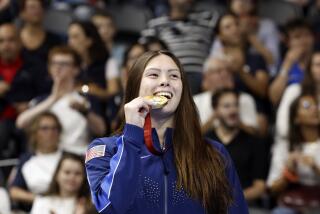BARCELONA ’92 OLYMPICS: DAY 3 : The Silence Finally Is Golden : Swimming: Morales, 27, completes comeback by winning 100-meter butterfly. Haislett wins 200-meter freestyle.
- Share via
BARCELONA — The silence, ever so brief, yet as loud as any noise he could imagine, was paralyzing and familiar to Pablo Morales.
Eight years ago, Morales reached the wall of the Olympic swimming pool in Los Angeles and was engulfed by a similar void. It takes only a second or two for a swimming scoreboard to calculate its hundredths and thousandths of seconds and to illuminate them in cold finality.
In 1984, the silence was broken only by a small cheer.
“The German contingent,” Morales said. He had been beaten at the finish and deprived of a gold medal by West Germany’s Michael Gross.
Monday night, Morales, 27, came again to an Olympic final. And again, there was the silence, after he touched the wall of Picornell Pool.
“I didn’t want to turn around,” he said. “I mean, I knew I wasn’t going to turn around quickly. I wanted to get my composure first. It was all reminiscent of the silence I heard in ’84.”
But this time, the monolithic scoreboard at the far end of the pool flashed a 1 next to Morales’ name and the time, a modest 53.32 seconds. They would soon hang a medal of gold from Morales’ neck, and if it was eight years too late, that only made it taste sweeter.
Merely hearing of his victory inspired U.S. women’s freestyler Nicole Haislett, and she went on to a gold medal in American-record time in the women’s 200 freestyle.
“My coach came into the pool and told me about Pablo,” Haislett said. “Just hearing it got people pumped up and excited.”
Morales had retired after failing in three events to make the U.S. team in 1988, and it wasn’t until last August, at 26, that he began his comeback.
In March, Morales won the 100-meter butterfly at the U.S. trials.
“When I started this comeback, it wasn’t to show how far a 27-year-old could go after 3 1/2 years off,” Morales said. “My specific goal was to make the Olympic team and, once that was done, to contend for a gold medal.”
Morales qualified fastest for the final, but hit the water virtually last off the blocks. Only his potent underwater kick kept him from dropping off precariously. Next to him was defending gold medalist Anthony Nesty of Surinam.
By the turn, Morales had taken the lead by 0.3 seconds. He was fading at the finish, only .03 ahead of Rafal Szukala of Poland. But that was the difference between a comeback fallen short and a dream made real.
Morales recalled that as a boy he would sit with his mother, who died in September, and watch filmmaker Bud Greenspan’s reverent Olympic documentaries.
“We would watch and we would always be touched by the segments on the Olympians,” Morales said. “When I was up on the victory stand, I was thinking that my mother would want to be here to experience this, and I know that she was with me in spirit.
“This,” he said, “was my time at last.”
The U.S. men’s team got its second medal of the night when Eric Namesnik took a silver behind world record-holder Tamas Darnyi of Hungary--he had also won the gold in Seoul--in the 400-individual medley. The U.S. 800-meter medley relay team won a bronze behind the Commonwealth of Independent States, which set the first swimming world record of the games, 7:11.95, and Sweden.
Haislett’s gold medal was a bright spot in what has been a disappointing start for the U.S. women. “The United States has a history of turning around meets,” Haislett said.
The U.S. women have won four medals in two nights. Haislett’s 1:57.90, however, has produced the only gold.
From these first two days of competition, a conservative pre-Olympic guess would have been seven medals, three of them gold.
The problems began Sunday night, when world record-holder Jenny Thompson was beaten in the 100 freestyle by China’s Yong Zhuang. Haislett, who was seeded second, finished fourth. Summer Sanders won a bronze in the 400 individual medley.
Monday, Thompson failed to qualify in the 200 freestyle, an event in which she was seeded second and was expected to win a medal.
And Anita Nall, the 16-year-old world record-holder, faded in the last 30 meters of the 200-meter breaststroke and finished third behind 14-year-old Kyoko Iwasaki of Japan and Li Lin of China. Jill Johnson, seeded second behind Nall--and nearly two seconds in front of any other swimmer in the world--did not make the final.
Thompson’s performance has been the most disappointing. She was thought to be peaking toward an avalanche of gold.
“I wasn’t physically or emotionally ready for the 100 free,” she said. “This was the first international meet where I’ve swum the 200 free. I knew after 150 (meters) that it was going to be hard.”
Nall was considered the favorite in the 200 breaststroke. “Everyone has their bad swims,” she said. Her time was 2:26.88, compared to her world record of 2:25.35.
Swimming Medalists
MEN
(100-meter butterfly)
GOLD Pablo Morales (United States)
SILVER Rafal Szukala (Poland)
BRONZE Anthony Nesty (Surinam)
(400-meter individual medley)
GOLD Tamas Darnyi (Hungary)
SILVER Eric Namesnik (United States)
BRONZE Luca Sacchi (Italy)
(800-meter freestyle relay)
GOLD CIS
SILVER Sweden
BRONZE United States
WOMEN
(200-meter freestyle)
GOLD Nicole Haislett (United States)
SILVER Franziska Van Almsick (Germany)
BRONZE Kerstin Kielgass (Germany)
(200-meter breaststroke)
GOLD Kyoko Iwasaki (Japan)
SILVER Lin Li (China)
BRONZE Anita Nall United States)
More to Read
Go beyond the scoreboard
Get the latest on L.A.'s teams in the daily Sports Report newsletter.
You may occasionally receive promotional content from the Los Angeles Times.






